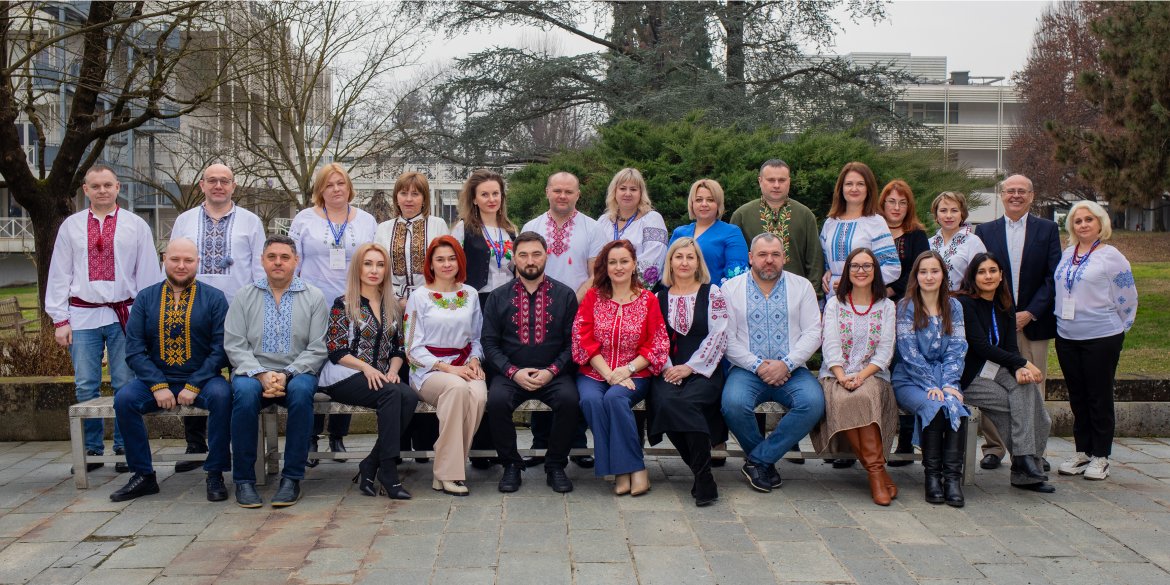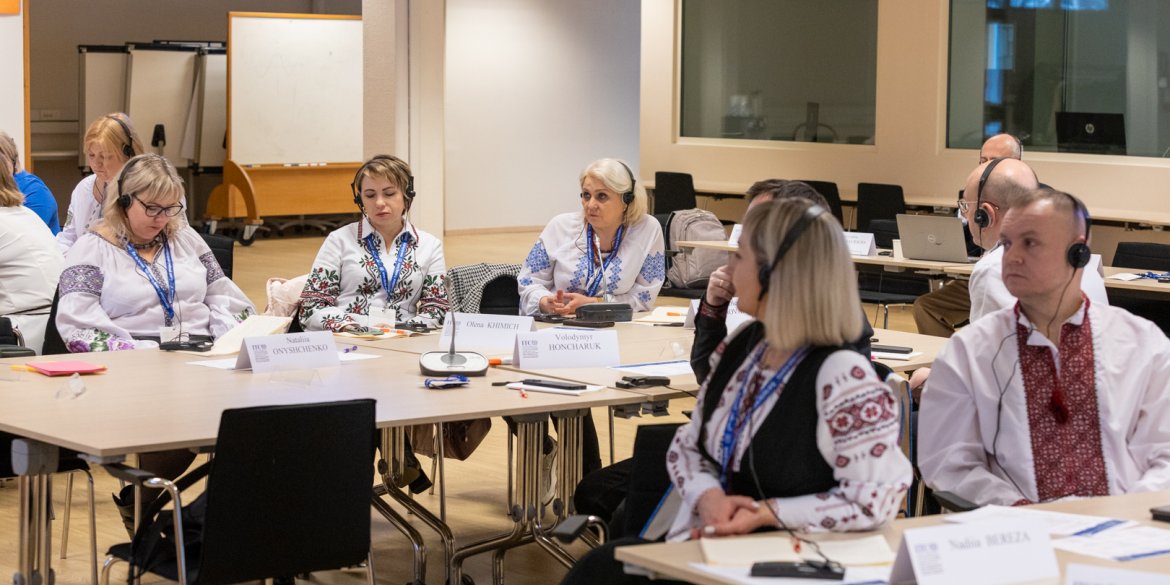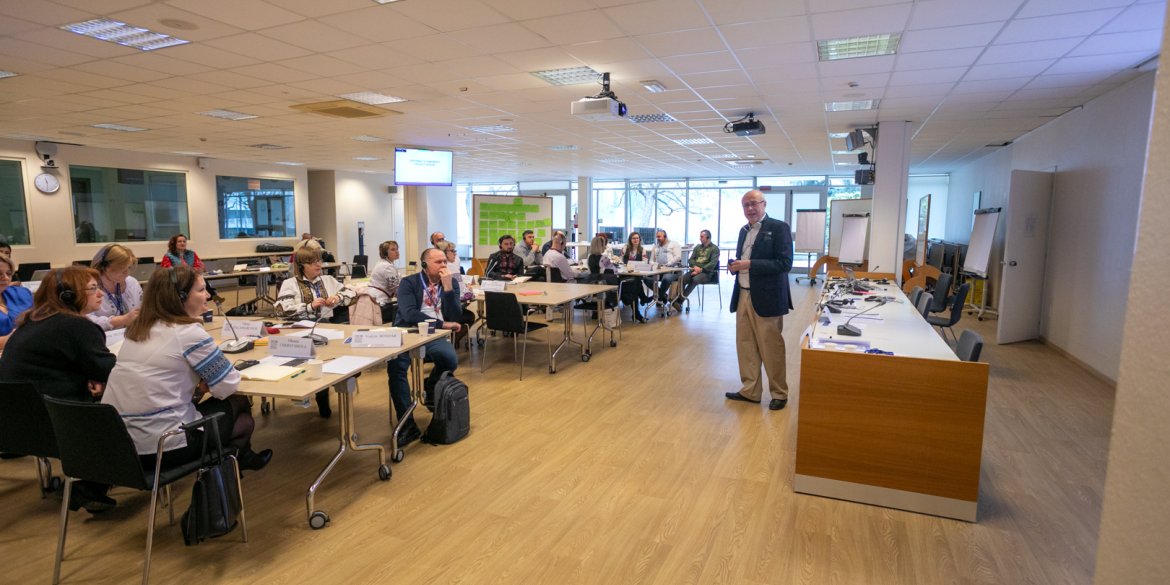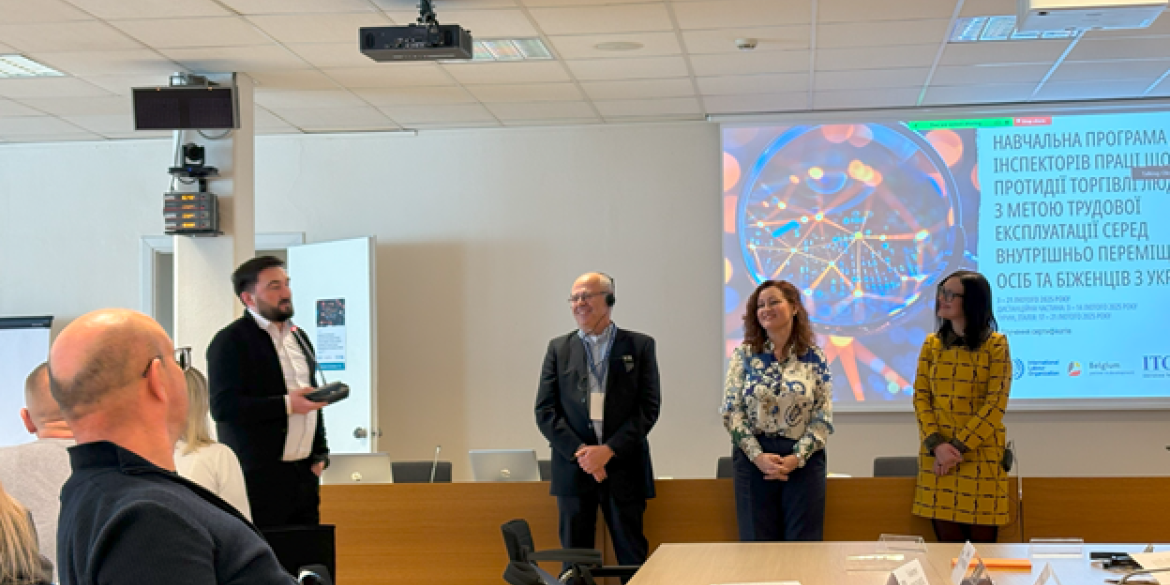Building Frontline Capacity: Labour Inspectors in Ukraine Tackle Human Trafficking Risks Among IDPs and Refugees
Building Frontline Capacity: Labour Inspectors in Ukraine Tackle Human Trafficking Risks Among IDPs and Refugees
30 septembre 2025

Photo © Adobe Stock/kwanchaift
The ongoing war in Ukraine has triggered one of the most severe humanitarian crises in recent memory, displacing millions of people both within and beyond the country's borders. As a result, Ukrainian internally displaced persons (IDPs) and refugees have become especially vulnerable to labour exploitation and human trafficking. Without secure employment options and often facing language barriers and legal uncertainty, these individuals are frequently targeted by traffickers who exploit their precarious status through forced labour, debt bondage, and other forms of abuse.
Recognising the crucial role of labour inspectors as frontline defenders of workers’ rights, the International Training Centre of the ILO (ITCILO), in collaboration with the ILO Ukraine Country Office, and funded by the Belgian development cooperation agency, launched a tailored capacity-building programme for labour inspectors of the State Labour Service of Ukraine.
The programme was designed to enhance inspectors’ ability to detect, prevent, and address trafficking for labour exploitation, with a specific focus on vulnerable populations such as IDPs and refugees. It explored wide-ranging inspection methods, communication strategies for working with at-risk groups, the use of digital tools for campaign and case management, and cross-institutional collaboration at both national and international levels. Particular attention was given to indirect inspections, strategic compliance planning, and identifying early warning signs during site visits.

The training brought together inspectors already engaged in addressing labour violations and connected them with ILO specialists and international experts from countries such as Brazil and institutions like the European Labour Authority.
Through expert-led sessions and peer exchange, the programme equipped participants with practical tools grounded in international labour standards and tailored to the Ukrainian context. It emphasised not only the technical skills needed to carry out effective inspections but also the importance of partnerships, data-driven strategies, and coordinated action to build a more just and protective environment for those most at risk.
A Crisis of Vulnerability Meets a Network of Response
Since the onset of the war, millions of Ukrainians have been displaced, facing uncertainty, precarious employment, and rising risks of exploitation. Labour inspectors are often the first line of defence. Yet, without specialised training, it can be difficult to recognise the evolving signs of trafficking or to act in complex multi-agency environments.
This course set out to change that. Tailored to the context of Ukrainian displacement, it provided 20 senior inspectors with a toolkit that blends international labour standards with hands-on digital tools, data analysis, and communication strategies.
“I believe this course was exceptional. Over the five-course days, 20 labour inspectors – 20 civil servants – acquired truly impressive techniques and established collaboration not only with inspectorates from other countries, but also with institutions like the European Labour Authority. I believe the training programme has fully achieved its objectives.”- Tetyana Minenko, Project Manager, ILO.
From Digital Classrooms to Real-World Labs

Structured as a blended learning programme, the training combined two weeks of online learning with a week-long workshop in Turin. The digital phase introduced key concepts, legal frameworks, and data-driven inspection strategies, hosted on ITCILO’s eCampus platform.
In Turin, the face-to-face segment brought participants together for deep dives into real-life scenarios. The sessions focused on identifying trafficking indicators, developing labour inspection campaigns, and strengthening partnerships across borders. Activities ranged from simulated inspections to collaborative group work on social media campaigns to raise public awareness.
“This course is a practical tool that we can take and use in our daily work. It can significantly improve our efficiency and effectiveness, and even elevate the overall image of the labour inspectorate in Ukraine.” - Olena Konovalova, Deputy Director of the Labour Department at the State Labour Service of Ukraine.

Global Expertise, Local Impact
The training drew on a wide pool of international experts – from Brazil’s Ministry of Labour to the European Labour Authority – who shared practical strategies from different legal and operational systems. Sessions featured speakers such as Luiz Carlos Lumbreras Rocha (ILO Budapest), Rumsha Shahzad (ILO Geneva), Olena Vazhynska (ITCILO) and Pedro Assares (ELA Bratislava), among others.
Delivered bilingually with support of the ITCILO’s eCampus platform, the programme not only enhanced inspectors’ technical capacities, but also provided action points for future inspection campaigns, leveraging new technologies in the day-to-day operations and potential transnational collaboration in a cross-jurisdictional reality.
“This training demonstrates the ITCILO’s commitment to equipping labour inspectorates with the tools they need to respond effectively to evolving risks of human trafficking and labour exploitation. What set this programme apart was its combination of legal, operational, and preventative approaches with forward-looking tools such as data-driven inspection planning and digital case management, including the use of AI for inspection targeting and algorithmic data mining. It is a concrete example of how international cooperation, innovation, and capacity development come together to strengthen labour rights and protections in times of crisis.”- Olena Vazhynska, Programme Officer, ITCILO.

Through integration of the elements of the ILO’s Strategic Compliance Planning (SCP) methodology and targeted training on social media campaigns for awareness and prevention, participants were equipped to act both reactively and proactively within their mandate.
“I’m confident that the knowledge gained here will be applicable not only in the field of combating human trafficking but across other areas of the State Labour Service’s work as well.” - Oksana Yezerska, Head of the Western Interregional Department at the State Labour Service of Ukraine.
A Strong Finish – and a Strategic Way Forward

The course culminated in the co-creation of actionable strategies for inspection planning, digital case management, and public engagement campaigns. Participants proposed developing tools such as a national complaint registration platform and integrating labour inspectorates into Ukraine’s National Referral Mechanism for victim protection. This action planning ensures the training won’t remain theoretical – it will fuel lasting change in institutional practices across Ukraine.
“This training will certainly be applied in Ukraine. Today, one of the main challenges is the identification of human trafficking cases – and that’s one of the core responsibilities of labour inspectors. Identifying such cases, conducting analytical work to plan inspections, and identifying sectors or employers where such labour might be used – these are among the top priorities for labour inspectors in Ukraine today.”- Volodymyr Honcharuk, Deputy Head of the State Labour Service of Ukraine.
What’s Next?
With 100% of participants recommending the training, the results speak for themselves.
Looking ahead, participants expressed strong interest in follow-up courses on topics like undeclared work, cross-border inspection, AI-powered monitoring, and inclusive workplace adaptation.

As Ukraine navigates a turbulent period, this training exemplifies the power of international cooperation to build resilience from the inside out. By investing in its inspectors, the country is fortifying its labour inspection system and standing firm against trafficking and exploitation.
Activity Manager Olena Vazhynska
Activity Assistant Viktoriia Lavrynovych
Social Protection, Governance and Tripartism (SPGT)
International Training Centre of the ILO


